new posts in all blogs
Viewing: Blog Posts Tagged with: True Detective, Most Recent at Top [Help]
Results 1 - 6 of 6
How to use this Page
You are viewing the most recent posts tagged with the words: True Detective in the JacketFlap blog reader. What is a tag? Think of a tag as a keyword or category label. Tags can both help you find posts on JacketFlap.com as well as provide an easy way for you to "remember" and classify posts for later recall. Try adding a tag yourself by clicking "Add a tag" below a post's header. Scroll down through the list of Recent Posts in the left column and click on a post title that sounds interesting. You can view all posts from a specific blog by clicking the Blog name in the right column, or you can click a 'More Posts from this Blog' link in any individual post.

By:
Heidi MacDonald,
on 5/15/2015
Blog:
PW -The Beat
(
Login to Add to MyJacketFlap)
JacketFlap tags:
Fox,
Planet of the Apes,
The Simpsons,
Cartoon Network,
HBO,
Adult Swim,
amc,
Top News,
preacher,
Rick and Morty,
True Detective,
Dawn of the Planet of the Apes,
Captain America: Civil War,
Movies,
Television,
Add a tag
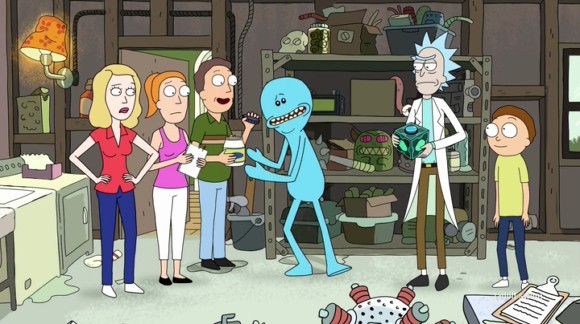
– My favorite discovery from the 2014 television season has to be Cartoon Network’s Rick and Morty, which takes the character relationship of Doc and Marty (more or less) from Back to the Future and transplants them into Doctor Who style adventures with some the sharpest humor I’ve seen in an animated program since Archer first hit the air. The series, created by Dan Harmon (Community) and Justin Roiland, has had its first season available on Blu-ray for awhile now. If you can handle some cruder, gross-out moments, I highly recommend it.
This week, Cartoon Network announced that Rick and Morty will return on Sunday, July 26th. Additionally, Roiland and Harmon guest-wrote the couch gag for the upcoming season finale of The Simpsons, which you can watch below:
– Speaking of The Simpsons, yesterday saw the news that Harry Shearer, the longtime voice of characters like Ned Flanders, Principal Skinner, and many other members of the show’s rich world, would be parting ways with the series. According to some reports, there’s still a chance that Shearer may come to terms with the show’s producers, but the roles are expected to be recast at this point.
I haven’t watched The Simpsons in years, but I’m hoping this paves the way for a Spinal Tap reunion.
– From the set of Captain America: Civil War, via JustJared, here’s the first image of Crossbones’ costume:
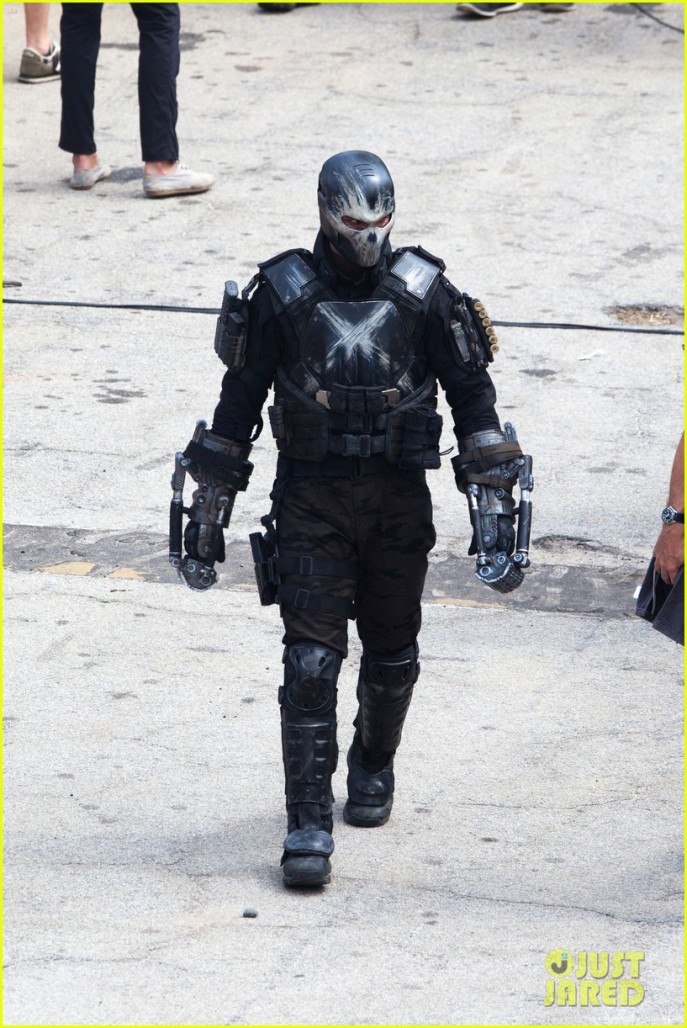
– Seth Rogen tweeted out the first on-set image from AMC’s Preacher last night, which sees Dominic Cooper’s Jesse Custer talking with Ian Colletti’s Arseface:
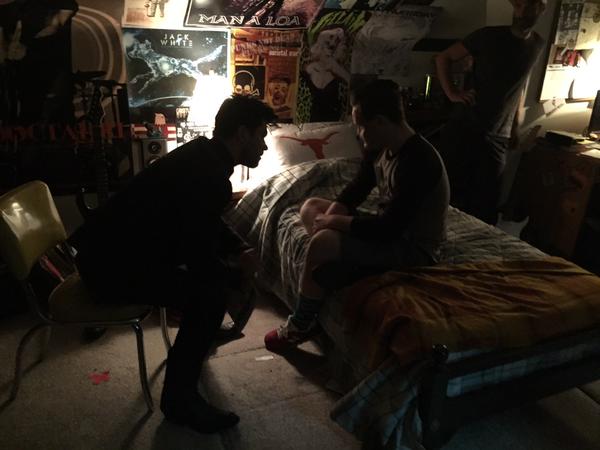
– According to Collider, the sequel to Dawn of the Planet of the Apes now has a title: War of the Planet of the Apes. It’s a bit of a mouth-full, but I guess no one would go see a movie called “Monkey Fight”, which I was lobbying pretty hard for.
– Lastly, there’s a pretty great True Detective Season 2 teaser out now via HBO. I may be more excited about this premiere than any other show this year, even the Mad Men finale!

By:
Heidi MacDonald,
on 4/22/2015
Blog:
PW -The Beat
(
Login to Add to MyJacketFlap)
JacketFlap tags:
Movies,
Television,
Star Trek,
Joss Whedon,
Showbiz,
Robert Downey Jr,
Top News,
edgar wright,
True Detective,
marvel movies,
Marvel Cinematic Universe,
Add a tag

After yesterday’s Valiant and Daredevil news items and today’s Eisner nominations, you’d think we could shut the door down on news for a while. But, surprise surprise, there’s still a few other items of note, here’s the rundown:
– Joss Whedon, while on the press circuit for next week’s Avengers: Age of Ultron, held court with Buzzfeed, and in a pretty revealing interview about his time at Marvel that is well worth reading, he happened to elaborate on his feelings regarding Edgar Wright‘s departure from Ant-Man:
I thought the script was not only the best script that Marvel had ever had, but the most Marvel script I’d read. I had no interest in Ant-Man. [Then] I read the script, and was like, Of course! This is so good! It reminded me of the books when I read them. Irreverent and funny and could make what was small large, and vice versa. I don’t know where things went wrong. But I was very sad. Because I thought, This is a no-brainer. This is Marvel getting it exactly right. Whatever dissonance that came, whatever it was, I don’t understand why it was bigger than a marriage that seemed so right. But I’m not going to say it was definitely all Marvel, or Edgar’s gone mad! I felt like they would complement each other by the ways that they were different. And, uh, somethin’ happened.
One you hear Whedon make a statement like that, it’s hard not to wonder what could have been (not that many weren’t already). I’ve long held that parting ways with Edgar Wright was one of the biggest missteps Marvel has made thus far and the loss of his idiosyncratic take on Scott Lang would be felt pretty heavily come this July. But, movies have to be seen before you can judge them, and we’ll find out soon enough.
On that note, Avengers: Age of Ultron is currently sitting at 84% on Rotten Tomatoes with 49 reviews in. If that score holds, it’ll put the film just below Iron Man (93%), The Avengers (92%), Guardians of the Galaxy (91%), and Captain America: The Winter Soldier (89%) in the Marvel canon, if you care about that kind of thing.
– One more Ultron related note, those of you who are aspiring to be professionals in the field of journalism may not want to follow the example set by Krishnan Guru-Murthy from Britain’s Channel 4 news, whose junket press questions caused Robert Downey Jr. to walk out of the interview:
Seriously, save the hard hitting stuff for when it’s warranted and expected, not in promotional interviews for a superhero film.
– The third Star Trek film in the rebooted franchise now has a rumored title: Star Trek Beyond. The rumor comes via TrekMovie who discovered Paramount’s recent MPAA registration of the title. To be honest, I don’t love it, but it’s also a good sight better than Star Trek Into Darkness, which was an awful pun. At the very least, perhaps this ensures that exploration will be the key factor for the new Star Trek entry.
– With True Detective Season 2 just a couple of months away, HBO has released some ominous looking motion posters via the show’s official twitter feed:
Creepy stuff!
– And finally, in a fun little piece, here’s what this Summer’s big blockbuster releases would look like in 90’s VHS form. Oh, do I ever miss Blockbuster, until I think about the late fees and scrambling to get the latest video tapes.

By:
Heidi MacDonald,
on 4/9/2015
Blog:
PW -The Beat
(
Login to Add to MyJacketFlap)
JacketFlap tags:
Movies,
Television,
Marvel,
The Incredibles,
Showbiz,
Top News,
True Detective,
avengers age of ultron,
X-Men: Apocalypse,
Add a tag
Happy Day Before Daredevil Day! Here’s a round-up of things worth paying attention to on the Entertainment-front.
– Paul Bettany just unleashed the first full-blown Vision poster on Twitter. We’ve seen concept art, and a few other promotional pieces for the character’s upcoming appearance in Avengers: Age of Ultron, but this is Bettany in android mode up-close:
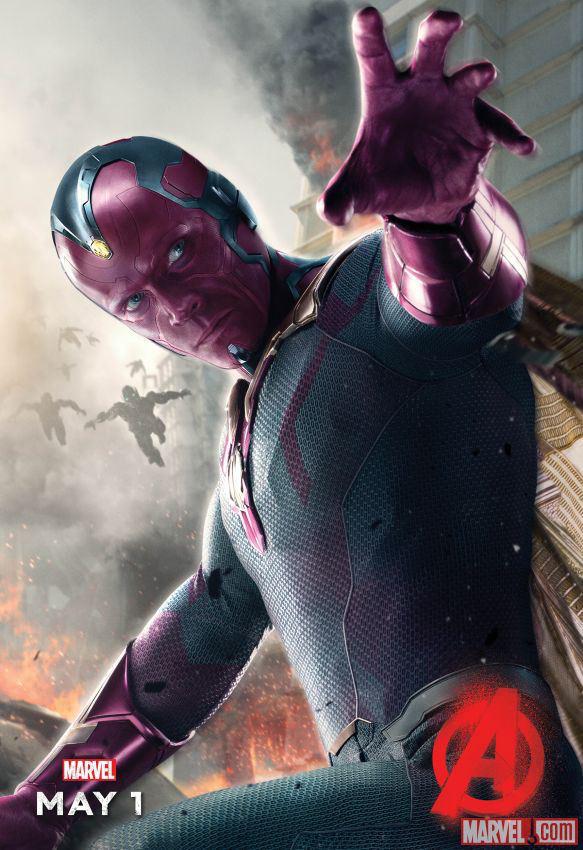
– Bryan Singer added another update for X-Men: Apocalypse, this time sharing some concept art of another mutant that will be joining the cast:

Yes indeed, Archangel will be a part of the film, and according to Singer he will be played by previously announced cast member Ben Hardy.
Other than Iceman, who can’t make an appearance, it looks like we’ll be getting something pretty close to the original X-Men line-up, along with a few Giant Size X-Men additions (Storm, Nightcrawler).
– For you fans of The Incredibles, Brad Bird just confirmed that he is currently working on the script for the sequel, now that his work on his about to be released Tomorrowland is completed. In a spate of sequels from Pixar, this might be the one that may stir up the most excitement.
– And in somewhat related news, given that Nic Pizzalatto pulled a good deal of influence for his True Detective series from the comics of Alan Moore and Grant Morrison, here’s the first teaser for True Detective Season 2. Given that I loved the first season, I can’t wait for this new one:

By:
[email protected],
on 4/7/2014
Blog:
Perpetually Adolescent
(
Login to Add to MyJacketFlap)
JacketFlap tags:
True Detective,
Roy Cady,
Books,
fiction,
crime,
Galveston,
hbo,
Nic Pizzolatto,
Book Reviews - Fiction,
Add a tag
 I have been completely and utterly addicted to (and obsessed by) True Detective so when I found out the show’s creator and writer had written a crime novel I had to read it. And what a cracking book it is. Using some of the same elements as his television show Pizzolatto has constructed a highly atmospheric, slow burning thriller.
I have been completely and utterly addicted to (and obsessed by) True Detective so when I found out the show’s creator and writer had written a crime novel I had to read it. And what a cracking book it is. Using some of the same elements as his television show Pizzolatto has constructed a highly atmospheric, slow burning thriller.
Roy Cady is a bagman who has just been diagnosed with cancer and sent on a job where he thinks his boss has tried to have him whacked. Now on the run he must navigate his way from New Orleans to East Texas with a young woman and her sister in tow. Roy is conflicted between his own short-term survival and that of the two girls now under his protection.
Just like True Detective Pizzolatto shifts time perception to perfection, drip feeding you bits of information, past and future, that leave you craving to know more.The raw emotion of Roy Cady is brutally and poignantly displayed and the way Pizzolatto describes the gulf coast landscape is an amazing blend of desolation and beauty.
We already know from True Detective that Nic Pizzolatto knows how to tell a story. Galveston proves that this talent was evident well before his HBO series.
Via Buzz Feed A list of dark, weird, and southern gothic books that every fan of HBO’s True Detective should read.
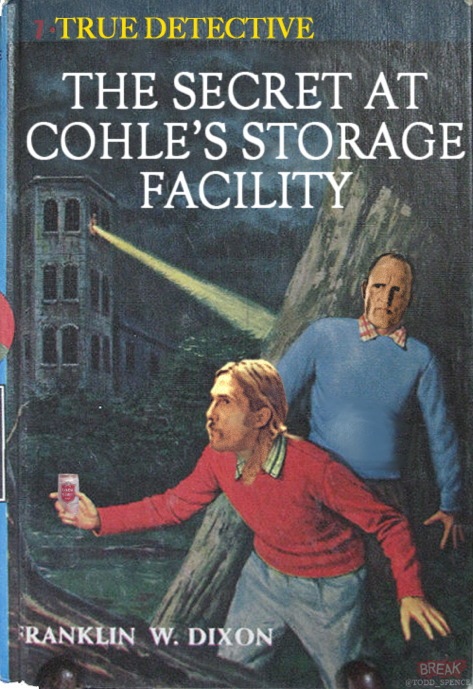
So this is why God gave us the internet: Todd Spence created these True Detective homages in the form of Hardy Boys detective novel covers. More in the link.
Speaking of True Detective—like everyone does these days—I had a few conversations about this over the weekend and observed that True Detective really played the Internet for a fool. All those complicated theories about Carcosa and whatnot…Nic Pizzolatto’s complex, many-tendriled story was simple at its core but with a novel’s structure. All those little touches weren’t part of a bigger mystery — they were part of a larger THEME. Marty’s daughter created a diorama of a gang rape with her dolls not because she had been a victim of the Yellow King but because…children are surrounded by the dangers of adult sexuality which they don’t understand and it can damage them, especially with, in this case, a father who failed to understand how he himself was part of the danger.
Chew on that, internet!
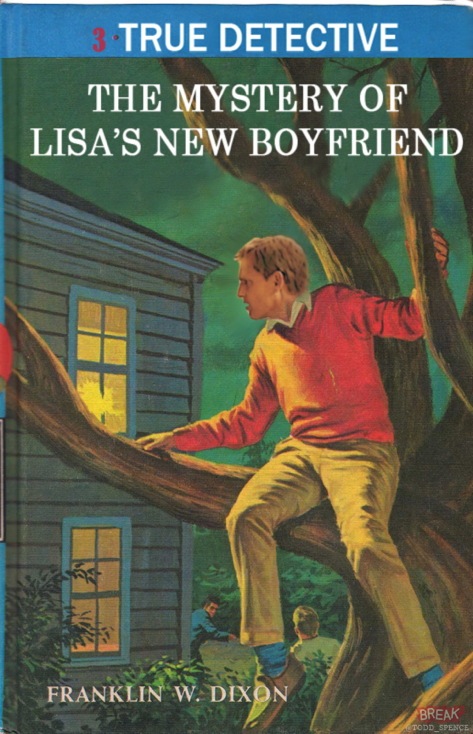
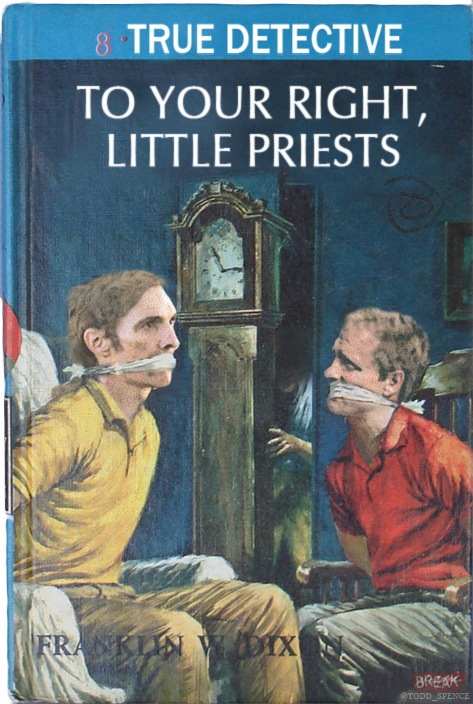
I got caught up in the hype, got curious, and found a way to watch
True Detective. It's my kind of thing: a dark crime story/police procedural/serial killer whatzit. Also, apparently the writer of the show, Nic Pizzolatto, is
aware of some writers I like, and even one I know,
Laird Barron. (Hi Laird! You rock!) What struck me right from the beginning was the marvelous music, selected and produced by the great
T-Bone Burnett, and the cinematography by
Adam Arkapaw, who shot one of my favorite movies of recent decades,
Snowtown, and also the very good film
Animal Kingdom and the marvelous Jane Campion TV show
Top of the Lake. Something about Arkapaw's sensitivity to color, light, and framing is pure mainlined heroin to my aesthetic pleasure centers. If I found out he'd shot a
Ron Howard movie, I'd even watch that.
So many other people have discussed the show that there are now, I'm sure, nearly as many words written about it as there are words in Wikipedia. My own opinion of the show is of no consequence, though for the curious, here's what I said about it on Jeff VanderMeer's Facebook page, where some discussion was going on: "
I liked the music, cinematography, most of the acting and directing, but thought the writing was all over the place from pretty good to godawful. And episodes 7 and 8 were like the Goodyear blimp deflating mid-air and landing in a bayou of drivel. (The stars, the stars! Use the Force, Rust! The Yellow King is YOUR FATHER!!! Oh, wait...)"Much more interesting to me is the discourse around the show. Why did this show inspire such a fanatical response? Why did we feel compelled to respond? Zeitgeist, genre, etc. probably all play into it, but a fuller answer would require some time and research, particularly about how the show was marketed and where and how it first caught on. I'm enough of a pointy-headed academic to hope one day for a whole book about the construction of True Detective's appeal, something that doesn't neglect the material aspects: budgets, advertising, Twitter. I'd also like to see analyses of fan responses to mystery/crime shows — for instance, a comparison of fan speculations between seasons 2 and 3 of Sherlock and fan speculations about the mysteries of True Detective before the finale. The choice in season 3 of Sherlock to offer a relatively acceptable but not definitive answer to the mystery of how Sherlock lived was, I thought, quite smart, because even though the creators probably had (unlike Conan Doyle) an idea of an answer when they wrote Sherlock's "death", they realized by the time it came to write season 3 that no answer they could provide would be satisfying after two years of fan speculations. True Detective took a different approach, partly because they didn't realize viewers would react the way they did, or that the show would be subject to so much ratiocination, and so they gave a rather ridiculous and clichéd end to the mystery, one that made not a whole lot of sense and tied up only the most obvious of loose ends. Pizzolatto's interest was more in the characters than the plot, or perhaps not even the characters so much as the mood and the projection of an idea of complexity rather than any actual complexity. 
I am, myself, now falling into exegesis more than I intended. (It's fun to posit signs as wonders!) Really, what I wanted to do was collect a few writings about True Detective that I particularly liked, that got me thinking. The show has inspired some good writing about it. Here then, before they get lost in the din, are a few fragments I'll shore against these ruins........Jacob Mikanowski at LA Review of Books:The Southern Louisiana of True Detective is part truth and part myth. But just by showing so much of it, the show puts us in contact with its real history, even if it doesn’t spell everything out. But there are hints, especially on the margins. There’s the history of pollution, visible in the omnipresent cracking towers and in the condition of Dora Lange’s mother as well as the relative of another victim, a one-time baseball pitcher disabled by a series of strokes. There’s Louisiana’s French and Spanish past, glimpsed momentarily in the Courir and in a stray allusion by Rust to the Pirate Republic of Barataria. And then there’s the history of segregation and racism, barely present except for the suggestion that the schools most of the victims attended were a way around busing — like the “segregation academies” that sprang up in different parts of the Deep South as a response to Brown vs. the Board of Education.
In my dream version of the show, the detectives are historians or archivists. They could work equally well somewhere in the Mississippi Delta or Eastern Poland. The crimes they investigate are buried in the past, and the thing they realize eventually isn’t just that everyone knew, but that everyone was complicit. Coincidentally, while the first episodes aired, I happened to be reading Trouble in Mind, Leon Litwack’s magisterial history of the lives of Black Southerners under Jim Crow. And although I shouldn’t have been, I was shocked by his account of lynching — at how common it was, how popular, and how public. The audiences that gathered for lynchings were huge, and their appetite for suffering — burning and other tortures — as spectacle couldn’t be satisfied by mere killing. Children even played their own games of hanging and being hung. True Detective doesn’t go there — but in the sense it creates, of a past that infects the present, of ritualized violence that doesn’t end even after it officially disappears — it starts to open the door.
Dustin Rowles at Pajiba:That is literary inefficiency, and while it’s easier to understand in the context of a longer season in the midst of a longer series where it’s often necessary to pad out the episodes, and where showrunners are often forced by more demanding production schedules to wing it along the way, Pizzolatto had only eight episodes to write and the ability to plan out the entire season in advance. The irony, of course, is that he still had all the ingredients necessary to create a more compelling ending, and yet he still he chose to stick with the simpler, “There’s a Monster in the End” storyline. It’s a shame, too, because Pizzolatto obviously has a deep understanding of literature, and yet he chose the television ending over the literary one. Unfortunately, it seems, he knows how to introduce literary allusions, but he doesn’t show us he knows how to utilize them.
Joseph Laycock at Religion Dispatches:Of course, there’s nothing inherently wrong with a happy ending. But the final message of True Detective reinforces a dangerous mythology that’s already endemic in American popular culture. The brutal misogyny of the heroes, their willingness to commit all manner of felonies—this was not a Nietzchean tale of those who hunt monsters becoming monsters themselves. Instead, this is a moral universe where anything is justified as long as your opponent is “truly” evil and good “gains some territory.” This is about as far from Lovecraft’s cosmic horror as one can get.
Spencer Kornhaber at The Atlantic:Certainly Marty’s violence and sexism isn’t appealing; certainly Rust deserves the eye rolls that other characters threw his way. But creating flawed heroes isn’t subversive—it’s doing exactly what any decent fiction writer is supposed to do. A subversion would have been to make those flaws figure into the main narrative in some unexpected but crucial way. Maybe the “good guys” botch the case. Or maybe, per the theories mentioned before, they’re connected to the murders in ways they don’t understand till it’s too late.
Instead, both main characters got a fair amount of vindication in the end. Marty’s family doesn’t seem to hate him quite as much anymore. Rust believes in the afterlife now. They both go backslapping into the night. All of this comes from them catching a killer of women and children. So for the zillionth time in Western pop culture, men (straight, white ones at that) get psychic rewards for valorously risking themselves on behalf of the weak.
Susan Elizabeth Shepard at The Hairpin:If you're going to make a dead sex worker the inciting incident for your story, if one of the central characters is defined by his rage about the sexual purity of the women in his life, it needs to pay off in the form of story advancement and character development, otherwise it's just gratuitous, sensational, "edgy." And for the last several episodes, it's become clear that the only satisfying way for the mystery to end is for Rust or Marty to be the killer. But we're gonna get some dumb conspiracy of Louisiana good ol' boys who worship the devil, which is going to be unsatisfying and also not give the proper payoff to all that violence against women, which then becomes just so many witchy antler decorations with no clear meaning.
Matt Zoller Seitz at Vulure:Marty's hypocritical attitude toward his wife and daughters is positively Scorsesean in its misogyny. Never for a moment does the show pretend that he's got the right idea about fidelity, fatherhood, or anything else related to the women who live under his roof. He's got a gangster's idea of manhood: I'll do what I please, and you do whatever I tell you. He's the king of his castle, everyone else is a serf. Rust, meanwhile, is haunted equally by the death of his daughter (and subsequent guilt over his failure to preserve his marriage afterward) and his rocky relationship with his father, to whose home state, Alaska, he briefly returned; he's destroyed by his inability to live up to an unrealistic standard of manly strength, goodness, and patience. It makes both dramatic and rhetorical sense that Marty and Rust's interrogators would be two black men, and that many of the detective's most mortifying and self-destructive moments stem from their inability to deal with women in an honest and non-condescending way. The show's disinterest in race relations and inability to resist gratuitous T&A shots damages its credibility greatly in this department, but the notion that True Detective is purely a white male supremacist fantasy is not remotely supported by the evidence.
Lili Loofbourow at LA Review of Books:Ask a woman whether Errol Childress matches the monster at the end of our dreams — I doubt you’ll get many nods. But there is a monster we might dream about in True Detective, and he’s everything a monster should be: murderous, violent, deeply sympathetic, and totally adept at spinning the Cohles of the world to his side. Here’s to TV’s greatest and most affable monster, Marty Hart.
Henry Farrell at Crooked Timber:Another interpretation, which seems to me to be equally plausible, is that the catharsis of the closing episode is false, and deliberately so. The darkness continues. Marty’s inattention to his family has had profound costs. The show strongly suggests that one of Marty’s daughters has been the victim of sexual abuse, in ways that mirror the detective story, just as the detective story mirrors the story of Marty’s family. Marty doesn’t seem aware of this at all. If Marty and Rust conclude that the light as winning, it is only because they fail to see the darkness that surrounds them, and cannot see it, so long as they continue to live in a world of purely brotherly camaraderie, a war of light against dark where one responds to male violence only with more violence and leaves women’s business to the women. Even when you are confronted with your true situation, you cannot necessarily free yourself from it. The detective’s curse means that you do not escape from Carcosa. You only think that you do because you are willfully blind to the Carcosa that surrounds you, the labyrinth made of the circle that is invisible and everlasting.














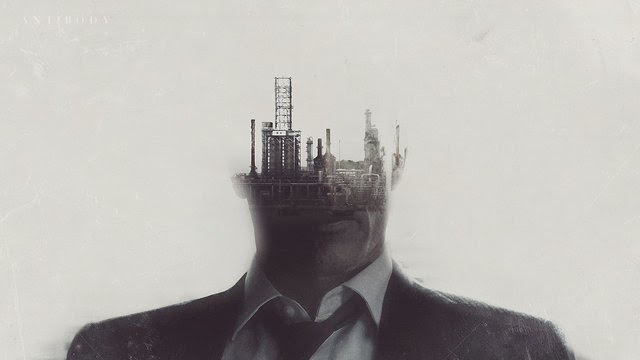

[…] Tweet […]